|
|
|
Sort Order |
|
|
|
Items / Page
|
|
|
|
|
|
|
| Srl | Item |
| 1 |
ID:
104294
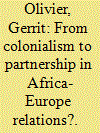

|
|
|
|
|
| Publication |
2011.
|
| Summary/Abstract |
The European Union has been trying to achieve its long-term goals through partnerships and cooperation with other like-minded global actors. Africa (through its regional institutional body, the African Union) has been the first and only multilateral entity with which the EU has forged a long-term partnership. Despite its rhetorical language, the Africa--EU Strategic Partnership is unlikely to upgrade the political and economic interaction between the two partners. In the past few years, serious rifts have grown between the EU and its African counterparts concerning trade agreements and development policies. Moreover, new actors have made significant inroads in Africa, providing an alternative to its long-standing dependence on Europe.
|
|
|
|
|
|
|
|
|
|
|
|
|
|
|
|
| 2 |
ID:
104288


|
|
|
|
|
| Publication |
2011.
|
| Summary/Abstract |
One year after the failure of the Copenhagen Climate Summit, the next conference of the parties to the UN Framework Convention on Climate Change and the Kyoto Protocol in December 2010 adopted the so-called Cancun Agreements. Thereby, the Cancun conference succeeded in keeping the UN climate process alive and averting serious damage to multilateralism more broadly. However, the Cancun Agreements fall seriously short of providing for effective action on climate change. The current weakness of the international framework reinforces the rationale for strengthening domestic EU climate policies. It also requires a further rethinking of the EU's international leadership strategy.
|
|
|
|
|
|
|
|
|
|
|
|
|
|
|
|
| 3 |
ID:
104304


|
|
|
|
|
| Publication |
2011.
|
| Summary/Abstract |
The EU and the US, mainly through NATO, have been successful in securing peace and prosperity in Europe during the Cold War and in promoting peace beyond Europe after 1990. With the emergence of new powers and the rise of multipolarity, however, it is no longer apparent that transatlantic relations are indispensable and ways must be found to make sure that the relationship remains relevant. The EU and the US currently relate poorly to each other and as a result do not obtain the best possible outcome from their combined resources. Two elements are key to improving transatlantic relations: an inclusive policy towards Turkey (in the strategic interests of both the EU and the US); and more permanent and workable structures suited to the realities of the 21st century.
|
|
|
|
|
|
|
|
|
|
|
|
|
|
|
|
| 4 |
ID:
104292


|
|
|
|
|
| Publication |
2011.
|
| Summary/Abstract |
The ambitions of the global South for a larger share of global wealth and political power are at least partly being played out on the African continent. The increasing Africa--South relations seem to indicate a relative decline in Africa--North ties, with the shift in Africa's trade relations from North to South resulting in trade creation rather than trade diversion. The South partners are also providing much needed infrastructure development assistance to the continent. Politically, these relations are formalised in a host of frameworks and associations and operate in fundamentally different ways from those between Africa and its erstwhile colonial masters. It is doubtful, though, to what extent Africa's capacity to influence the global agenda is strengthened, especially given that not a single African country is (yet) a member of the 'South Big Four', the BRICs.
|
|
|
|
|
|
|
|
|
|
|
|
|
|
|
|
| 5 |
ID:
104308
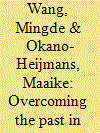

|
|
|
|
|
| Publication |
2011.
|
| Summary/Abstract |
Historical disputes and nationalism continue to be issues of concern and controversy in the relationship between Japan and China. In 2005, popular nationalist sentiment culminated in nationwide anti-Japanese movements in China. This led to a crucial shift in the way China and Japan deal with history and popular nationalism. An unprecedented dialogue on war memory was initiated in late 2006, and the Sichuan earthquake relief effort in mid-2008 marked a further departure from earlier patterns. The Chinese government shifted away from conventional historiography that largely fed negative images of Japan. While these developments point to new, cooperative attitudes that aim to contain popular nationalist sentiment in manageable proportions, relations are nevertheless increasingly obscured by other tensions in the bilateral relationship.
|
|
|
|
|
|
|
|
|
|
|
|
|
|
|
|
| 6 |
ID:
104291
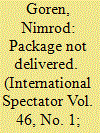

|
|
|
|
|
| Publication |
2011.
|
| Summary/Abstract |
Incentives are capable of creating favourable environments in which peace processes can make progress. This is especially true for mega incentives, which can assist in overcoming political and socio-psychological barriers to peace. In Israeli-Arab peacemaking, incentives have not yet proven efficient. To date, they have been used in a limited and inefficient manner. In 2010, the US offered Israel incentives in return for an extension of Israel's settlement freeze. This move failed due to unfavourable political conditions and scepticism regarding its ability to bring about a major breakthrough. Nevertheless, it signaled that incentives are now an integral tool in US diplomacy and could serve as a step towards crafting a multi-national mega incentive package for Middle East peace.
|
|
|
|
|
|
|
|
|
|
|
|
|
|
|
|
| 7 |
ID:
104290


|
|
|
|
|
| Publication |
2011.
|
| Summary/Abstract |
Despite the efforts put into negotiations, they have created a self-perpetuating cycle of disappointment, frustration and empty dialogue. With contradictory Palestinian and Israeli agendas - Palestinians negotiating for an independent state, an end to occupation, etc., and Israel negotiating primarily over security concerns - one must question the reason behind prolonged negotiations. Is US mediation, accused by many of extreme bias towards Israel, to blame? Or are negotiations an Israeli objective to execute a particular political agenda? In spite of the international community's recognition of establishing an independent Palestinian state, the current reality on the ground undermines any creation of one. This reality was allowed only by the strategic prolonging of negotiations. A particular focus on the proceedings following the Oslo Accords explains how Palestinian--Israeli negotiations have been used to pursue a specific objective.
|
|
|
|
|
|
|
|
|
|
|
|
|
|
|
|
| 8 |
ID:
104300
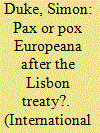

|
|
|
|
|
| Publication |
2011.
|
| Summary/Abstract |
The time is nigh for the EU to think more strategically about its global role. This is suggested by the confluence of changes in the international system itself and the internal changes introduced by the Lisbon Treaty. When approached via a geopolitical prism, the EU's main interests lie in its neighbourhood, to the east and south, central Asia and the Gulf. These are regions where the EU enjoys the most influence. The EU should therefore engage with other international actors, both traditional and emerging, in an intensified dialogue concentrating in particular on these areas. A Union with a clearer idea of what it is trying to accomplish on the world stage, backed by the means and determination to succeed, could herald a regional pax Europeana, while a continuation of the EU's current drift will condemn it to increasing irrelevance - a pox Europeana.
|
|
|
|
|
|
|
|
|
|
|
|
|
|
|
|
| 9 |
ID:
104297
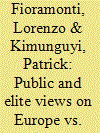

|
|
|
|
|
| Publication |
2011.
|
| Summary/Abstract |
Europe has been the privileged economic and political partner of Africa, but more recently China has increased its foothold in Africa through important financial investments and trade agreements. Against this backdrop, the empirical research conducted in 2007-08 in Kenya and South Africa as part of a pioneering international project investigates the perceptions of public opinion, political leaders, civil society activists and media operators. While confirming their continent's traditional proximity to Europe, African citizens are increasingly interested in China and its impact on Africa's development. Europe is criticised for not having been able to dismiss the traditionally 'patronising' attitude towards Africa. While African civil society leaders and media operators describe China as an opportunity for Africa to break free of its historical dependence on European markets, other opinion leaders warn against too much enthusiasm for the Asian giant. There is a suspicion that the Chinese strategy might, in the long run, turn into a new form of economic patronage.
|
|
|
|
|
|
|
|
|
|
|
|
|
|
|
|
| 10 |
ID:
104306
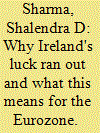

|
|
|
|
|
| Publication |
2011.
|
| Summary/Abstract |
Given its impressive economic performance over the past two decades, Ireland earned the title, the 'Celtic Tiger'. However, as the contagion from the subprime-induced global financial crisis spread, Ireland's boom went bust. In short order, Ireland (like Greece before it), had to seek financial assistance from the EU and the IMF to stave off sovereign default and national humiliation. How did Dublin and the eurozone respond to the crisis and what lessons can be learned from Ireland's experience? While Ireland grapples with its huge public debt, the EU needs to instill confidence in the markets before the current rolling debt crisis becomes a systemic threat to the eurozone.
|
|
|
|
|
|
|
|
|
|
|
|
|
|
|
|
|
|
|
|
|